Market Recipe Blog: Tomato Basil Bruschetta

Tomatoes and basil love the hot summer temperatures, and we love pairing them together. Eaten fresh, summer tomatoes are nothing like their grocery store counterparts, and are fragrant, delicate and delicious. This is a timeless way to enjoy the magical mid-summer moment when tomatoes, onion and basil are all in season. Try one of our heirloom varieties at market, and find fresh baguettes at our Saturday vendor A Bread Affair!
Tomato Basil Bruschetta
Recipe (adapted from Cookie + Kate)
- 2 pounds ripe tomatoes
- 1/2 cup finely chopped white onion
- 1 bunch chopped fresh basil
- 2 gloves garlic, pressed or minced
- 4-5 tablespoons extra-virgin olive oil
- balsamic vinegar
- 1/2 teaspoon sea salt, plus more to taste
- 1 baguette
Instructions
- Preheat your oven to 450F.
- Dice your tomatoes and transfer them to a medium mixing bowl, leaving the tomato seeds and juice behind on the cutting board. Stir the salt into the tomatoes, and add the onion, basil and garlic as they are ready. Stir to combine and set the mixture aside to marinate while you work on the bread.
- Slice your baguette on the diagonal into pieces no wider than ½-inch. Lightly brush both sides of each slice with olive oil (this will require about 2 to 3 tablespoons oil). If you don’t have a brush, pour olive oil into a bowl and dip each slice into oil on both sides.
- Place the slices in a single layer on your prepared baking sheet and bake them on the middle rack for 6 to 9 minutes, until they’re crisp and nicely golden on top. Transfer the toasts to a serving platter, and set aside.
- When you’re ready to serve, carefully drain off the excess tomato juice that has accumulated in the bowl, using your hand as a stopgap. Add the remaining 2 tablespoons of olive oil. Stir to combine, and season the mixture with additional salt, to taste.
- Top each toast with tomato mixture, tipping your spoon against the bowl to release excess juice as necessary. Lightly drizzle a couple of tablespoons of thick balsamic vinegar on top, and sprinkle lightly with flaky salt if you have any.
Pick up produce at any of our three weekly markets: Tuesdays 4-6:30PM at the UBC Farm, Wednesdays 11:30AM-1:30PM at the UBC Bookstore, and Saturdays 10AM-2PM at UBC Farm. Learn more about our produce and browse other recipes in our Market Recipe Blog. Recieve regular market recipes from our newsletter here.
Saturday Farmers’ Market Vendor Feature: Osoyoos Fruit Market King
By nicole ma on August 14, 2019
Saturday Farmers’ Market Vendor Feature: Osoyoos Fruit Market King
This week, our featured vendor is Osoyoos Fruit Market King, who bring fresh fruit directly from their orchard to the market! They are a family-run business that has been growing fruit since 1994. We had a chance to interview Jas and ask some questions about their business and their products and this is what we learned!
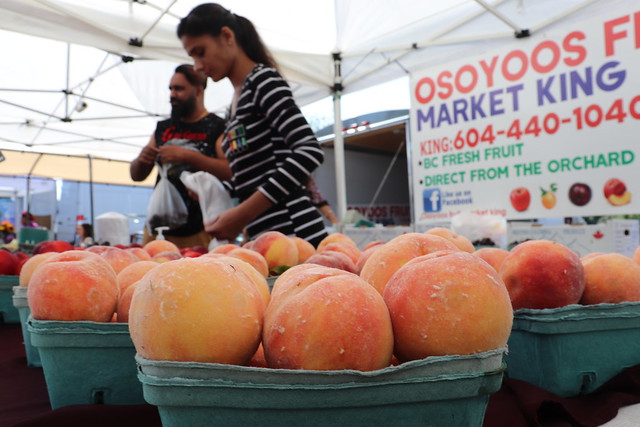
Osoyoos Fruit Market King at market!
What types of fruit can we expect to see at the market throughout the season?
We carry a large variety of fruits. Currently, we have two types of cherries, Bing and Rainier (which happens to be Jas’ favourite fruit!), two types of apricots, Tomcot and Goldbar, peaches, nectarines, pears, grapes and apples!
What would you like customers to know about your fruit?
All of our products are fresh, straight from the orchard. We pick our fruit one day before coming to market, which ensures that it’s as fresh as possible for our customers’ enjoyment! Our fruits are all in perfect quality- we ensure that there’s no damaged products in the boxes that we sell. Check out our Facebook page as well! There we have more videos about our fruit, how we separate them, and what work we do on the farm!
Do you have any favourite dessert recipes using your fruit?
I have a very good one for peaches! You can cut the peaches into chunks, skewer them, and then put them on the barbecue. When you take them off, drizzle it with honey, or chocolate, whatever you like, and it’s absolutely delicious!
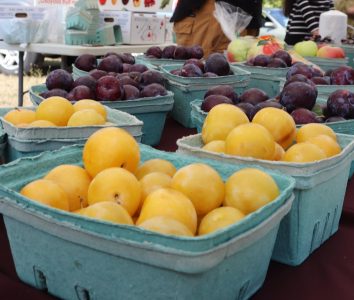
Where can your fruit be found outside of the UBC Farm Saturday Farmers’ Market?
We’re attending other markets as well, such as Ladner Farmers’ Market, Kwantlen Street Market, Steveston Market and Tsawwassen Market.
Osoyoos Fruit Market King can be found at the UBC Farm Saturday Farmers’ Market on the following dates: Aug 17, Aug 24, Aug 31, Sep 07, Sep 14, Sep 21, Sep 28, and Oct 05. For more information on Osoyoos Fruit Market King, you can check out their Facebook, email them at osooyosfruitemarketking@gmail.com, or call them at 604-440-1040.
Researcher Profile: CSFS Associate Sean Smukler
By Justin Lee on August 10, 2019
Researcher Profile: CSFS Associate Sean Smukler
UBC Associate Professor of Applied Biology in the Faculty of Land and Food Systems and Soil Science Junior Chair in the department of Agriculture and the Environment.
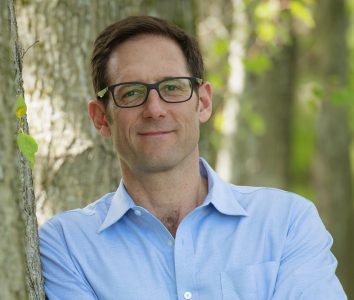
What is your current research project and what is it all about?
My lab, the Sustainable Agriculture Lab, works on helping farmers in two specific ways: we help farmers reduce their environmental impact and we help farmers adapt to climate change.
What’s next for this project?
One of the projects we are now just launching is a five-year project to mitigate greenhouse gases; working with forage, potatoes and blueberries. We’re monitoring and quantifying greenhouse gases from those systems and evaluating how much carbon could be stored in farmers’ soils. Our goal is to provide some management recommendations to those farmers. We’re also working on an assessment of how soil carbon is changing in the Fraser Valley depending on various land uses and soil management practices. Another project that we’re just launching is looking at how to better manage nutrients in organic farming systems. This means specifically identifying the challenges of meeting nutrient demands for organic vegetable production.
Why does this work matter to you?
I think understanding the intersection of the environment and agriculture is something that we really need to get a handle on. Considering the dual challenge of global food security and global environmental sustainability, agriculture is right in the nexus of that. Yet we, as a society, have not employed very effective strategies for incentivizing farmers to adopt practices that will improve their farms’ sustainability or reduce their environmental impact.
What surprises you about this work?
I’ve been a little surprised about how little support agriculture has from government in terms of research and development. For a sector of its importance, it is not getting as much support as it should. I don’t think that people have an awareness of the need for food production because it is so plentiful at the moment from places such as California, but give it ten years and BC’s agricultural landscape will look very different.
How important is the Centre for Sustainable Food Systems at the UBC Farm to your work?
It’s pretty essential, in terms of having a research facility. The Faculty of Land and Food Systems has two agricultural research facilities: the Dairy Research facility in Agassiz and the Centre for Sustainable Food Systems at the UBC Farm. It is really important to have a controlled experimental setting to study some of the things that we’re interested in. We do a lot of on-farm work, and that is equally valuable, but without the controlled setting, it’s really hard to come up to the conclusions that can be applied in the field.
How valuable is it to engage your students with the UBC Farm?
I think it’s really critical for students to have hands on experience and to get exposure to a wide range of scientific fields. The UBC Farm offers an opportunity for me and my class to expose students to a bunch of methodologies for different fields. Agroecology really does encompass a wide variety of fields and gives students a sense if it is something that they’re interested in doing. Without getting your hands dirty, it’s really difficult to know that.
What should people know about the UBC Farm that they probably don’t know?
They should definitely know that whether it looks like it or not, it’s a really state of the art facility to do some important agricultural research. I think we’re pushing the boundaries in specific scientific ventures. It may not look like a typical classroom, but it definitely is one.
What’s your favourite thing to do at the UBC Farm?
I really like showing students examples of what I’ve been talking about in class. There’s nothing like talking about intercropping and then going out to the Farm and seeing clover or kale under sown. Under sowing involves sowing a crop after a main crop has been harvested to cover the soil and provide benefits such as nutrient retention and mitigates the harmful impacts of soil erosion. I enjoy explaining why the Farm is doing that, or why the Farm would like more information on that particular practice. It definitely feels good when the real world and the lecture intersects out there.
If you weren’t researching agriculture, what would you be doing?
I think I’d be a farmer. Or the other thing I’ve thought about doing is policy.
Anything else you would like to add?
The UBC Farm has the potential to connect researchers on campus, especially those who are interested in food systems, food production and the environment. It seems like it has the potential to be a real important hub of change. This project that we’re doing to improve nutrients on organic farms looks promising. We’re going to be trialing on 20 farms in the region. At some point, we’re going to get all the people together and develop some strategies. It’s really an opportunity to get a bunch of farmers and scientists together at the UBC Farm and start building connections.
Market Recipe Blog: Roasted Beet Tart
By lewish on August 6, 2019
Market Recipe Blog: Roasted Beet Tart

One of summer’s great treats is the rainbow of colours found in bunched beets. This tart gives you the perfect chance to show off the colours and patterns of these tender summer beets while taking advantage of fresh herbs and onions also found at the market stall. Look for golden (yellow), chioggia (pink), and red beets at our markets and don’t toss those tops; they’re great cooked up like spinach or chard (we love cooking beet greens in this warm salad with mushrooms)!
Roasted Beet Tart
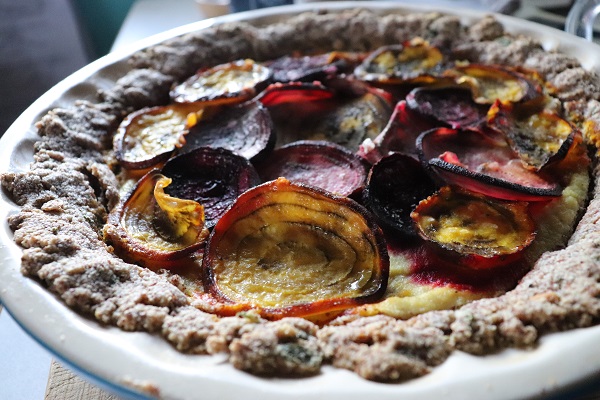
Recipe (adapted from Andrea Bemis)
- 2 cloves minced garlic
- 5 tablespoons fresh parsley finely chopped
- pinch crushed red pepper flakes
- 1/3 cup olive oil
- 1 tablespoon + 1 teaspoon water
- 2 cups almond flour/meal
- 2 cups raw cashews, soaked in warm water 30-60 minutes
- 1 tablespoon fresh thyme
- 1 large egg OR flax egg (1 tbsp ground flax + 1 tbsp water, mixed and let to sit 15 mintues)
- 1 bunch of beets, thinly sliced (a mix of colours makes it pretty)
- salt and pepper
- 1 tablespoon butter or oil
- 1 small fresh onion, diced
Instructions
- Preheat your oven to 400F.
- Stir together the garlic, 2 tablespoons of the parsley, red pepper flakes, 1/3 cup olive oil, water, and almond flour/meal. Press into an oiled 9″ pie or tart pan, using your fingers or the back of a spatula, until the crust evenly covers the bottom and up the sides.
- Bake about 15 minutes, until crust is lightly golden.
- Heat 1 tbsp butter/oil in a pan on medium heat and cook onion until translucent. Add salt and pepper to taste, and thyme.
- Drain cashews and stir into onion mixture and add the egg/flax egg. Blend/purée until smooth.
- Spread the purée evenly across the crust, then layer with thinly sliced beets (avoid a lot of overlap; those spots may not cook through) and a pinch of salt.
- Bake in oven until beets are shriveled and cooked; about 30-40 minutes.
- Serve garnished with parsley!
Pick up produce at any of our three weekly markets: Tuesdays 4-6:30PM at the UBC Farm, Wednesdays 11:30AM-1:30PM at the UBC Bookstore, and Saturdays 10AM-2PM at UBC Farm. Learn more about our produce and browse other recipes in our Market Recipe Blog. Recieve regular market recipes from our newsletter here.
Market Recipe Blog: Summer Gazpacho
By noni nabors on August 1, 2019
Market Recipe Blog: Summer Gazpacho
The height of summer usually means two things: hot temperatures and fridges stuffed full of fresh vegetables. This recipe will help you address both. Gazpacho is a refreshing chilled summer soup that you can easily customize with whatever veggies you have on hand. Mix it up with green tomatoes, scallions, or any other greens for a cool summer soup to help you beat the heat.
Summer Gazpacho
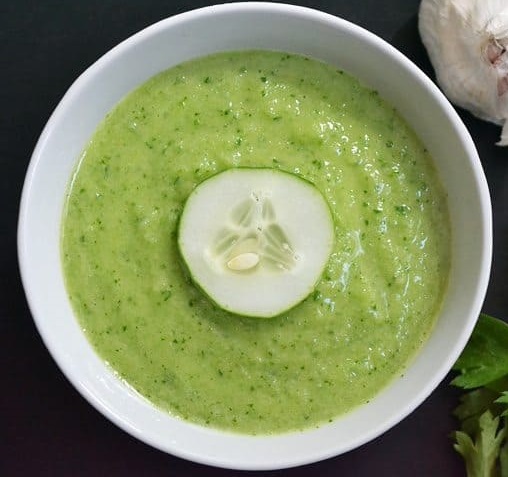
Recipe (adapted from Budget Bytes)
- 2 medium field cucumbers
- 1 medium sweet onion
- 1 garlic clove
- 1 medium avocado
- 1/4 bunch fresh parsley
- 1/4 bunch fresh cilantro
- 1 cup chopped greens, such as arugula or mizuna
- 2 Tbsp olive oil
- 1 Tsp salt
- 2 Tbsp lemon juice
- 1 cup water
Instructions
- Remove the ends from the cucumber and slice in half lengthwise. Scrape the seeds out with a spoon and then chop the cucumber into chunks. Dice the onion. Add the cucumber, onion, garlic (peeled) and greens to a food processor. Process until the vegetables are minced.
- Pull the leaves from the parsley and cilantro bunches. Add the leaves to the food processor along with the olive oil and the flesh from the avocado. Purée until smooth.
- Add the water, one tablespoon of lemon juice, and one teaspoon of salt. Purée until smooth again. Taste the soup and adjust the salt or lemon juice if desired.
- Serve immediately or chill until ready to eat.
Pick up produce at any of our three weekly markets: Tuesdays 4-6:30PM at the UBC Farm, Wednesdays 11:30AM-1:30PM at the UBC Bookstore, and Saturdays 10AM-2PM at UBC Farm. Learn more about our produce and browse other recipes in our Market Recipe Blog. Recieve regular market recipes from our newsletter here.
Saturday Farmers’ Market Vendor Feature: Craftwilder
By nicole ma on July 31, 2019
Saturday Farmers’ Market Vendor Feature: Craftwilder
This week, we are featuring Craftwilder, a Chilliwack-based local company that makes kombucha with hand-picked, ethically harvested, wild ingredients! Their super refreshing kombucha also contains no refined sugars, and has little-to-no carbonation. We had a chance to chat with the owner, Ian, and ask him some questions.
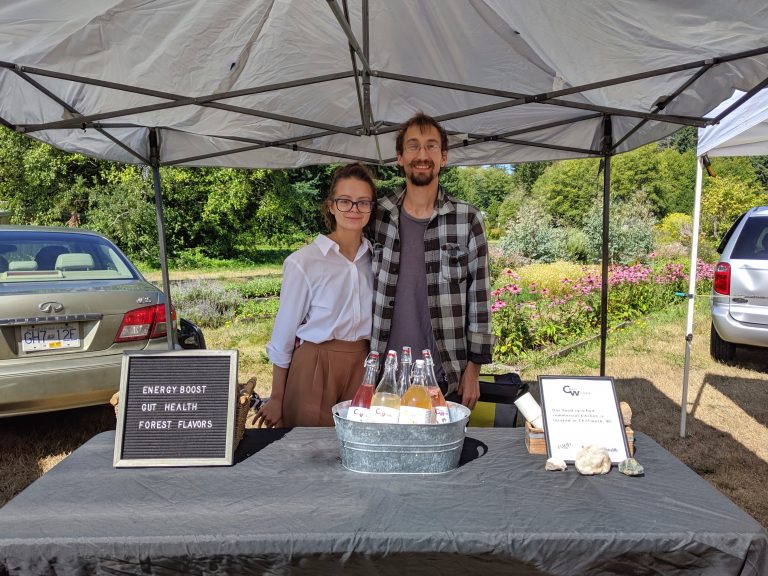
Craftwilder at market!
What exactly is kombucha? What benefits does it offer?
Kombucha is essentially tea fermented using a SCOBY (a symbiotic culture of bacteria and yeast). The SCOBY culture consumes the sweetener, which in our product is local unpasteurized honey, and in the process, produces gluconic acid, lactic acid, acetic acid and other digestive enzymes. This is great for our bodies as it helps sustain and support our digestive and immune systems as well as gives us a bit of an energy boost. Most people don’t realize that most of our health actually stems from our gut so if we have good gut health, generally speaking, the rest of our body will follow suit.
Additionally, we’ve coupled our kombucha with ingredients that are considered highly medicinal, although we don’t advertise our product as a medicinal product. We harvest our ingredients ourselves and use a lot of quite uncommon ingredients, which is why we we also bring books to the market that show more information and evidence about the plants and the ecosystems they grow in.
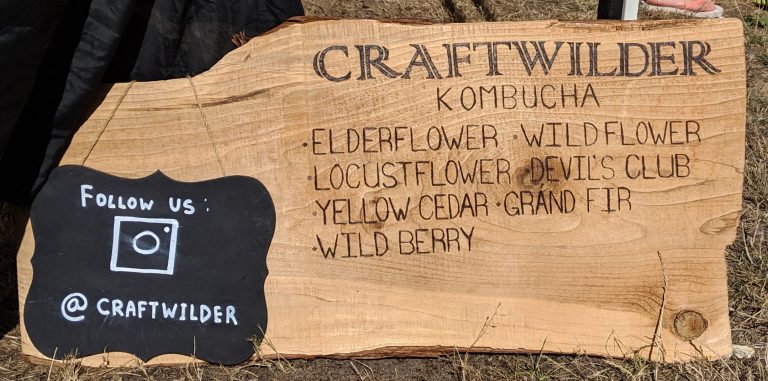
What types of ingredients do you use and what flavours do you currently offer?
Over the years, I’ve produced over 250 different flavours using ingredients such as rhizomes, flowers, tree foliage, berries, nuts, and mushrooms. Generally speaking, there’s no limit to what can be harvested and what can be used.
We like to change our flavours with the seasons and with what’s available. Our current flavours are Grand Fir, Yellow Cedar, Mixed Wildflower, Elder flower, Devil’s Club, Mixed Berry and Black Locust Flower. They also have three new flavours coming in the next market so go check them out and try them for yourself! Stop on by their stall to also hear an explanation of the benefits of each flavour.
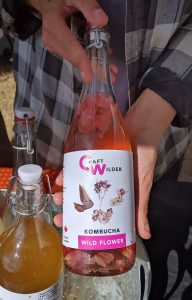
Which flavours are the most popular?
Our flavours are quite even in popularity. I enjoy different ones at various times depending on how I am feeling and how my body is feeling. I personally really enjoy the Devil’s Club and have it almost everyday both topically and internally. I find that it brings me to an equilibrium and allows me to focus throughout my day a little bit better as well. The Wild Berry and the Grand Fir are also quite popular.
How do you brew your kombucha with little to no carbonation? A lot of store-bought kombucha is quite carbonated and very sweet.
Part of our procedure is actually limiting the amount of carbonation, which is why we classify our kombucha as little-to-no carbonation. We don’t do a second ferment of our kombucha and we don’t add enough sweetener to actually produce an excessive amount of carbonation. Before we bottle it, we also cool it to help further prevent carbonation build-up. A lot of other companies do a second ferment in the bottle and will often add more sweetener to their kombucha.
Our most carbonated kombucha would most likely be our Berry flavour, which sits at 5 – 10% carbonation compared to other kombuchas on the market. Our kombuchas take from 6 days to 8 weeks to ferment, depending on the properties of the ingredients used.
Is there anything else you want your customers to know about Craftwilder?
We harvest our own ingredients so we really want to promote the sustainability and harvesting of intact ecosystems. Protecting our resources is very important so we take the time to harvest regeneratively and ethically without destroying any of the ecosystems or disrupting them. We want to make sure there’s enough there for First Nations and for others like myself who want to go out and visually enjoy or use these ingredients in topical or food products. Our wild ingredients are free of the intentional spraying of biochemicals, pesticides and fertilizers which can leach into our foods and is related to a lot of illnesses.
Does your name hold any special meaning behind it?
There is an intention behind the name- my position as a harvester is commonly referred to as a wildcrafter, which is somebody who harvests a lot of wild ingredients and crafts something out of it whether it’s food or topical products. I switched the words around and that’s how the Craftwilder name was invented!
Craftwilder can be found at the UBC Farm Saturday Farmers’ Market on the following dates: Aug 03, Aug 10, Aug 31, Sep 14, Oct 05, Nov 02, Nov 23. For more information on Craftwilder, check out the following links: Website | Facebook | Instagram.
Researcher Profile: Adrien Kroese, Former International Research Student
By catherine hodgson on July 30, 2019
Researcher Profile: Adrien Kroese, Former International Research Student
MSc Organic Agriculture at Wageningen University & ISARA-Lyon
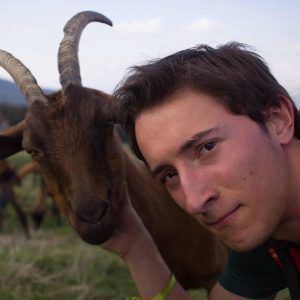
Adrien Kroese posing with an Alpine Goat
What is your research project, and what is it all about?
My research is about measuring sustainability. What is a sustainable farm? What are sustainable practices? Is what we picture as a sustainable farm actually sustainable?
What has that project looked like up until this point?
We define the sustainability of a system by its contribution to environmental preservation, economic welfare and social justice, and by its ability to continue to function in time, absorb shocks, and adapt to a changing environment. The project looks like a list of indicators that describe the properties of sustainable farming systems: self-reliance, social equity, the use of natural inputs, the non-use of very energy-intensive inputs, and pollution.
How are you measuring these distinct facets of sustainability?
Some of the long-term aspects of sustainability come down to key economic accounting variables: whether you’re making a profit in the long run, whether you will not have to pay too much debt back in the coming years, whether you can still make a profit in the long run. Long-term sustainability also comes down to environmental and social indicators: do you have a resource base that is being preserved? Do you manage your soil in a way that keeps it productive in the long run? Is labour available? Is your farm attractive as a work-place? We’re trying to identify all the variables that constrain or enhance the functioning of the farm in the long term. Our measure of sustainability also includes externalities (such as pollution) that might not affect the farm directly, but will affect the region.
What is the relationship between sustainability and the Certified Organic designation?
We tend to have the assumption that organic is sustainable. It is, in many cases. When you go out to a genuinely sustainable farm, you know it immediately, because you see the biodiversity. However, there are also big Certified Organic mono-crops that are very similar to their non-organic pairs. My research aims to discover what sustainable agriculture is, once you transcend the impression that organic always equates to sustainable.
What surprises you about this work, either in terms of process or results?
There’s consensus on the concept of sustainability, but also discord. There’s consensus on the fact that sustainability encompasses social, economic, and environmental preservation, that sustainability is urgent, and that sustainability denotes the ability to function in the long term. How the concept of sustainability translates into practice, however, is very unclear. Take, for example, a small-scale farm: there’s enough calories produced on that farm to feed everyone who works it and more, but many fewer calories produced than on a large-scale conventional wheat operation. Is that actually sustainable? Will we be able (at least in the current regime) to feed people with small-scale diversified farms? Because to do so will require a lot more labour in agriculture, which is not the model that we have been following. Despite the fact that there’s tradeoffs, however, I do believe that diversified agroecosystems are much more resilient in the face of change.
What’s next for the project?
The next step of this project is seeing where we have trade-offs and synergies between different facets of sustainability. One example of such a trade-off is the fact that you can easily make a profit by depleting your resource base: you can have very high income but then a very low score in environmental sustainability. Right now we’re setting up indicators on different farms to collect data, which we hope to use to quantify some of these trade-offs.
How did you get into this work in the first place?
Pure personal interest. I like agronomy, and I like seeing how elements connect together to make a system work. On the West Coast, there’s a lot of research being done on sustainable agriculture, so I went to see if they have a project about that here, and they had! The Diversified Agroecosystems Research Cluster wanted to answer the question; “are diversified agroecosystems more sustainable than conventional farming systems?” My research (quantifying the sustainability of respective agricultural systems) is one piece amongst other projects that are attempting to answer that research question.
How does the CSFS fit into your work?
I work for the Centre for Sustainable Food Systems at the UBC Farm and the Diversified Agroecosystems Research Cluster. I use data from the UBC Farm for my case study.
What should people know about the CSFS that they probably don’t know?
We might be criticized for not connecting enough with the agricultural reality. What I would like people to know – especially professionals in the agricultural sector – is that we really want to reach out to farmers, to work with them, to work for them, to come up with the tools that they need to work towards more sustainable farming systems.
What’s your favourite thing to do at the UBC Farm?
Walking around. Because it’s gorgeous and pretty effortless.
Global Climate Strike
By melanie kuxdorf on July 26, 2019
A Climate Crisis is a Food Systems Crisis
Please read this letter from our directors to understand what we are doing to support the Climate Strike, and why.
CSFS Memo on the Global Climate Strike
The Centre for Sustainable Food Systems is committed to addressing the accelerating climate change crisis. Along with many of our UBC colleagues and students, we agree that climate change is the single-most important challenge for this and coming generations.
Food systems play a critical role in the global carbon cycle, resource management, and biodiversity conservation. Our research, teaching, and actions directly address these issues.
We support the Climate Strike on Friday, September 27, supporting local, youth-led actions at UBC and in Vancouver, as well as globally. To show our commitment to climate action, the Centre for Sustainable Food Systems and the UBC Farm will be closed on Friday, September 27, reducing the barriers for our faculty, staff, and students to attend the UBC and Vancouver Climate Strike. We have also signed the open letter to UBC demanding climate action.
This decision has come about through many thoughtful discussions with our faculty, staff, students, and community programmers. Our markets the following week may be impacted by the reduced harvest, which is a small disruption when compared to the current and future impacts of unchecked climate change. We will provide Quest Food Exchange with a larger-than-usual donation of any late-harvested produce to minimize food waste.
We encourage CSFS faculty, staff, and students to participate in the Climate Strike. Staff should check with their supervisors regarding reassignment of their hours, if needed. Students should check with their instructors around class cancellations and/or making up any lost academic time.
Part of the CSFS’s mission is to provide leadership in research and teaching on food systems and climate resilience, as well as the impacts of climate change on food systems and other ecosystems. We are also committed to seeking ways to reduce our carbon footprint and are actively working on assessing and improving our own practices, goals, and findings, transparently and with participation from relevant stakeholders. We look forward to discussing what we can do better to achieve these goals, and encourage you to reach out to us with your ideas, to make change, together.
Juli Carrillo, acting Academic Director
Clare Cullen, Operations Director


Putting Your Garden to Bed for the Winter
By Salloum on July 24, 2019
Putting Your Garden to Bed for the Winter
About this Workshop
About this Workshop
The best gardeners know that gardening doesn’t begin in the spring, it begins in the fall! Learn techniques for over-winter soil-building, soil protection in rainy rainy Vancouver, and pest and disease prevention for the following year. Set yourself up for success while your garden sleeps for the winter.
About the Instructor
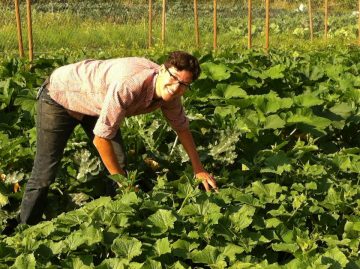
Mik Turje has been working in community food and agriculture for over a decade. First as a small-scale organic farmer on Vancouver Island and in Richmond where they grew a variety of veggies for farmers markets, CSA’s and high-end grocery stores. Then as a community development worker in the Food and Urban Agriculture movement. Mik was the Urban Agriculture Coordinator at The Stop Community Food Centre in Toronto for many years, where they taught a full slate of gardening workshops and mentored new gardeners. Mik now runs a small food security organization in Renfrew-Collingwood.
Date and Time
DATE Wednesday, September 11 | 6:00 – 8:00 pm (2 hours)
Location
UBC Farm
3461 Ross Drive, Vancouver BC
Cost
$29 Standard ($25 Student) + GST
Register for this workshop
Saturday Farmers’ Market Vendor Feature: Tempea
By carissa kirk on July 24, 2019
Saturday Farmers’ Market Vendor Feature: Tempea
This week, we are featuring Tempea, a local company that makes the freshest tempeh in town! Stop by this Saturday to try their product, and check out their non-soy tempeh made from chickpeas and lentils. We had the chance to ask Ariela, a Tempea co-founder, some questions at the last market they attended and this is what we learned about the company:

What is the product you’re selling, and what is it made of?
We sell tempeh, which is traditionally made from fermented soybean, and this product originates from Indonesia. The way people eat it is very similar to tofu- it comes in a block, you can cut it up and cook it any way that you want. It’s a great source of protein and fiber and we have a non-soy version which is chickpea and lentil, and I think this is one of the things that makes us different. Not only do we make non-soy tempeh, but we also make tempeh that is not pasteurized or marinated so people can get it fresh and marinate it in any way that they want to.
Can you tell me about the variety of the tempeh you sell?
Right now we only have our soy and chickpea-lentil options, but we are always playing around with our different types. We just sold out of our lima bean, which was very popular and last summer we had a “black-eyed pea.” We are going to try to launch another variety this summer, but my lips are sealed for now!
Why is the name “Tempea”?
We were students in BCIT and Andrew and I had a final project for our product development class. So, we developed a product made using chickpeas, lentils, and dried beans. Andrew, who grew up in Indonesia, was very familiar with tempeh so he said: “why not make tempeh from chickpeas?” Because we used chickpeas, and we made tempeh, we thought we’d call it Tempea and it took off!

What is your favorite way to eat tempeh?
Personally, I prefer soy tempeh because it is milder and nuttier. I just do a quick marinade with soy sauce and tamari with lots of garlic and lime juice. If you pan-fry it with coconut oil that adds even more nuttiness and I just eat it with rice.
Can recipes be found on your website?
Yes, we have tons of recipes online! Last summer we even did a tempeh with fiddleheads dish. We try to encourage people to cook seasonally- so what they can find at markets, or whatever is local. We had a customer at today’s market that really liked the risotto recipe, and I told her to try with some morel mushrooms because it’s really really good! There are numerous recipes on our websites and so many ways to cook tempeh.
What is the strangest tempeh recipe you’ve come across?
One of the most creative uses I’ve seen was a tempeh meatball. You freeze it a bit and then run it through a cheese grater to get a minced meat kind of texture.
Where can customers find your product outside of the UBC Farmers’ Market?
We rotate regularly to various farmers’ markets. Tempea can also be found in various local retailers, all of which are listed on our website.
Tempea can be found at the UBC Farm Saturday Farmers’ Market on the following dates: Jul 27 & Aug 10. For more information on Tempea, see the following links: Website | Facebook | Instagram.